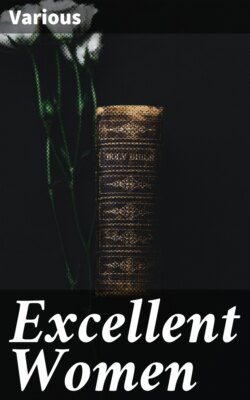Читать книгу Excellent Women - Various - Страница 30
На сайте Литреса книга снята с продажи.
LAST YEARS.
ОглавлениеThe end was now drawing nigh—the end of her busy, useful life. In June, 1843, Elizabeth Fry attended the Quarterly Meeting at Hertford, the last time she left home expressly on religious service. She felt it her duty, she said, "to encourage the weary, and to stir up to greater diligence the servants of the Lord, who uses weak and foolish instruments for His work," yet who is "made unto His people, wisdom, righteousness, sanctification, and redemption."
Symptoms of increasing feebleness led to her removal that autumn from her home at Upton Lane, to various places, Sandgate, Tunbridge Wells, and Bath, in hope of recovering her strength. But she knew that her time for active service was over. She frequently said to those about her, "I feel the foundation underneath me sure." Her concern was not about herself, but about those near and dear to her.
One of the last entries in her Journal is this: "I do earnestly entreat Thee, that to the very last I may never deny Thee, or in any way have my life or conversation inconsistent with my love to Thee and most earnest desire to live to Thy glory; for I have loved Thee, O Lord, and desired to serve Thee without reserve. Be entreated, that through Thy faithfulness, and the power of Thy own Spirit, I may serve Thee unto the end. Amen."
The year 1844 was one of much trial and affliction. Her husband's only sister died of consumption on July 2nd; a grandson of much promise was taken off at the age of twelve by the same disease towards the end of July; in August and September her second son and two of his young daughters were rapidly carried off by malignant scarlet fever. In the spring of the following year the death of her brother-in-law, Sir Thomas Fowell Buxton, excited her tenderest feelings. In fact, there was a succession of bereavements, which caused her to say in her Journal, "Sorrow upon Sorrow!" and after writing the long list of deaths, she closes the entry with these words "O gracious Lord! bless and sanctify to us all this afflicting trial, and cause it to work for our everlasting good; and be very near to the widow and the fatherless; and may we all be drawn nearer to Thee, and Thy kingdom of rest and peace, where there will be no more sin, sickness, death, and sorrow."
As to her own health, she rallied a little after returning home from Bath, but it was thought well to move from place to place for change of air, and for the pleasure of communion with loved friends. The beginning of 1845 saw her again in Norfolk, her husband and her daughter taking her to Earlham, where she enjoyed, for several weeks, the companionship of her brother, Joseph John Gurney, his wife, and other relatives. She went frequently to Meeting at Norwich, drawn in her wheeled chair, and thence ministering with wonderful life and power to those present.
The Annual Meeting of the British Ladies Society, an excellent organisation for visiting and caring for female convicts, although usually held at Westminster, was this year held in the Friends' meeting-house at Plaistow. After the meeting, which she had addressed several times in a sitting posture, she invited those present to come to her home, and it was felt that her affectionate words at parting were probably the last they would hear from her in this world.
As the year passed, it was thought that the air of the south coast might be useful, and the house at Ramsgate, Arklow House, which proved her last abode, was prepared for her. Her bed-chamber adjoined the drawing-room, with pleasant views of the sea, in which she delighted. While driving in the country, or being wheeled to the pier in a Bath-chair, she still strove to be useful, distributing Bibles and tracts, accompanied with a few words of kindly exhortation. Thus she was employed till the close of her days in work for the Master. She lingered, with gradual decay; and passed away, after a few days' illness which confined her to bed, on the morning of the 13th of October, 1845, in her 66th year. The last words she was heard to articulate, were "O dear Lord, help and keep Thy servant."
There was much sorrow when she had ended her useful life; and when she was taken to Barking for interment, a great number of people assembled, and a solemn meeting was held. But far beyond any local gathering, her example will continue to speak, through all the ages, and in many a land. There are many workers in our time in every branch of Christian usefulness, but the name and the work of Elizabeth Fry will be for ever remembered.
